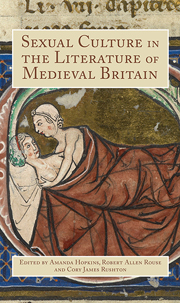Book contents
- Frontmatter
- Contents
- Introduction A Light Thrown upon Darkness: Writing about Medieval British Sexuality
- 1 ‘Open manslaughter and bold bawdry’: Male Sexuality as a Cause of Disruption in Malory's Morte Darthur
- 2 Erotic (Subject) Positions in Chaucer's Merchant's Tale
- 3 Enter the Bedroom: Managing Space for the Erotic in Middle English Romance
- 4 ‘Naked as a nedyll’: The Eroticism of Malory's Elaine
- 5 ‘How love and I togedre met’: Gower, Amans and the Lessons of Venus in the Confessio Amantis
- 6 ‘Bogeysliche as a boye’: Performing Sexuality in William of Palerne
- 7 Fairy Lovers: Sexuality, Order and Narrative in Medieval Romance
- 8 Text as Stone: Desire, Sex, and the Figurative Hermaphrodite in the Ordinal and Compound of Alchemy
- 9 Animality, Sexuality and the Abject in Three of Dunbar's Satirical Poems
- 10 The Awful Passion of Pandarus
- 11 Invisible Woman: Rape as a Chivalric Necessity in Medieval Romance
- Notes on Contributors
- Index
Introduction A Light Thrown upon Darkness: Writing about Medieval British Sexuality
Published online by Cambridge University Press: 05 August 2014
- Frontmatter
- Contents
- Introduction A Light Thrown upon Darkness: Writing about Medieval British Sexuality
- 1 ‘Open manslaughter and bold bawdry’: Male Sexuality as a Cause of Disruption in Malory's Morte Darthur
- 2 Erotic (Subject) Positions in Chaucer's Merchant's Tale
- 3 Enter the Bedroom: Managing Space for the Erotic in Middle English Romance
- 4 ‘Naked as a nedyll’: The Eroticism of Malory's Elaine
- 5 ‘How love and I togedre met’: Gower, Amans and the Lessons of Venus in the Confessio Amantis
- 6 ‘Bogeysliche as a boye’: Performing Sexuality in William of Palerne
- 7 Fairy Lovers: Sexuality, Order and Narrative in Medieval Romance
- 8 Text as Stone: Desire, Sex, and the Figurative Hermaphrodite in the Ordinal and Compound of Alchemy
- 9 Animality, Sexuality and the Abject in Three of Dunbar's Satirical Poems
- 10 The Awful Passion of Pandarus
- 11 Invisible Woman: Rape as a Chivalric Necessity in Medieval Romance
- Notes on Contributors
- Index
Summary
The hit HBO cable series Game of Thrones (2011–14) – the fantasy-medieval saga based on George R. R. Martin's Song of Ice and Fire novels – has provided more than its fair share of salacious sex scenes. Rape, marital rape, attempted rape, prostitution, group sex, sodomy (of both heterosexual and homosexual forms), incest, sex leading to castration, sex leading to leech-application, and even – occasionally – vanilla consensual sex, have appeared on the screen in the first four seasons of the show. The show, while generally well reviewed, has come under sustained criticism from certain sectors of the media for its depiction of a brutal medieval sexuality, a misogynous sexual culture replete with the threat of violent coercion. This popular (mis)representation of sex in what passes for the Middle Ages in the popular mind is, of course, far from a new phenomenon, and can be traced back through a long genealogy of such representations. One much dissected recent moment in this genealogy is found in Quentin Tarantino's Pulp Fiction (1994), where the African-American gangster Marsellus (Ving Rhames), having been saved from looming sodomitic rape by Bruce Willis's character Butch, vows his own distinct form of violent sexual revenge: ‘What now? Let me tell you what now. I'ma call a coupla hard, pipe-hittin’ niggers, who'll go to work on the homes here with a pair of pliers and a blow torch. You hear me talkin’, hillbilly boy?
- Type
- Chapter
- Information
- Sexual Culture in the Literature of Medieval Britain , pp. 1 - 12Publisher: Boydell & BrewerPrint publication year: 2014



